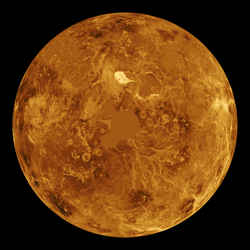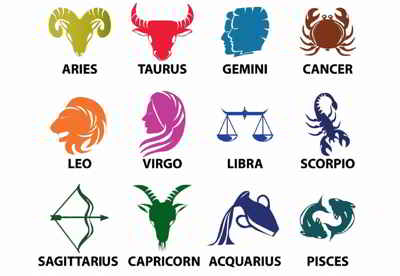Western Astrology: Classical Planets: Venus
 Venus has
rulership over Taurus, the sign that governs the 2nd house in the natural zodiac and Libra, the sign governing the 7th house.
Venus has
rulership over Taurus, the sign that governs the 2nd house in the natural zodiac and Libra, the sign governing the 7th house.
The seven classical planets are those easily seen with the naked eye, and were thus known to ancient astrologers. They are the Sun, Moon, Mercury, Venus, Mars, Jupiter and Saturn.
Venus was very similar to the earth at one time but because of the greenhouse effect, venus is full of violent storms and gases which makes it glow a very pretty array of pastel colors. Venus's sign, like Mercury's, is also very close to the sun sign and it shows how we love and what we want in a companion. Some Venus positions will show a person who doesn't want a companion. Some will show soul mate connections and some will show difficulties in connecting. Venus ruled love and young women in Greek mythology. Venus is the planet of love, creativity and beauty. She inspires romance, art, and fortune. When Venus is predominant in a person's chart or the current astrological view, they receive extra gifts in their appearance and attractiveness, which includes their financial outlook. Venus is the planetary ruler of both Libra Sun Sign and the Sign of Taurus.
Western Astrology: Classical Planets: Venus
Venus |
|

Venus is known as the planet of love and represents harmony and your pleasure centers; love, attraction, prosperity and contentment. In Roman mythology, Venus is the goddess of love and beauty, famous for the passions she could stir among the gods. Her cults may represent the religiously legitimate charm and seduction of the divine by mortals, in contrast to the formal, contractual relations between most members of Rome's official pantheon and the state, and the unofficial, illicit manipulation of divine forces through magic. The ambivalence of her function is suggested in the etymological relationship of the root venes- with Latin venenum (poison, venom), in the sense of "a charm, magic philtre".
Venus is the second planet from the Sun, orbiting it every 224.7 Earth days. It has no natural satellite. It is named after the Roman goddess of love and beauty.
Radius: 3,760 miles
Distance from Sun: 67,240,000 miles
Length of day: 116d 18h 0m
Mass: 4.867E24 kg (0.815 Earth mass)
Orbital period: 225 days, spending about 18.75 days in each sign of the zodiac.
Surface area: 177.7 million sq miles
Venus' cycle is variable. She is bigger than Mercury, and viewed from the Earth, her average daily motion is also of one degree, similar to that of the Sun and
Mercury. Venus never moves further than 48 degrees away from the Sun, slightly more than Mercury. Venus is the second brightest object in the night sky,
the Moon being the brightest. It is usually beheld as a twin planet to Earth.
Astrologically, Venus is associated with the principles of harmony, beauty, balance, feelings and affections and the urge to sympathize and unite
with others. It is involved with the desire for pleasure, comfort and ease. It governs romantic relations, marriage and business partnerships,
sex (the origin of the words 'venery' and 'venereal'), the arts, fashion and social life. The 1st-century poet Marcus Manilius described Venus as
generous and fecund and the lesser benefic.
The planet Venus in medicine is associated with the lumbar region, the veins, parathyroids, throat and kidneys. Venus was thought to be
moderately warm and moist and was associated with the phlegmatic humor. In modern astrology, Venus is the ruler of the second and seventh houses.
Rules Day of the Week: Monday
"Friday's child is loving and giving" might refer to the Venus nature, that is, a person who is loving and receptive to love. Venus, the goddess of love and beauty is the goddess of Fridays, and so people born on Fridays are going to love everything to do about love. Who doesn’t love Fridays? One reason is that this is the day before the weekend. The other is, this is the love ruled day.
Venus is the planet of Friday. In languages deriving from Latin, such as Romanian, Spanish, French, and Italian, the word for Friday often resembles the word Venus. Dante Alighieri associated Venus with the liberal art of rhetoric.
Chinese Astrology and Norse Paganism
In Chinese astrology, Venus is associated with the element metal, which is unyielding, strong and persistent. In Indian astrology, Venus is known as Shukra and represents wealth, pleasure and reproduction. In Norse Paganism, the planet is associated to Freyja, the goddess of love, beauty and fertility





